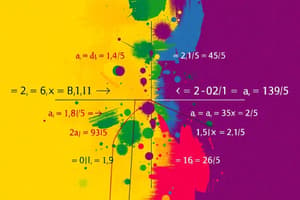Podcast
Questions and Answers
What value represents the probability of an event that is certain to occur?
What value represents the probability of an event that is certain to occur?
- 0.25
- 0.5
- 0.0
- 1.0 (correct)
If the probability of an event is expressed as
rac{3}{4}, what is its equivalent percentage?
If the probability of an event is expressed as rac{3}{4}, what is its equivalent percentage?
- 25%
- 50%
- 75% (correct)
- 100%
Which of the following options correctly describes a probability of 0?
Which of the following options correctly describes a probability of 0?
- The event occurs half the time.
- The event will never occur. (correct)
- The event will almost always occur.
- The event is impossible but may occur occasionally.
In a scenario where all outcomes are equally likely, how is the probability of an event calculated?
In a scenario where all outcomes are equally likely, how is the probability of an event calculated?
What does a probability of 0.5 signify in terms of event occurrence?
What does a probability of 0.5 signify in terms of event occurrence?
What is the correct definition of probability?
What is the correct definition of probability?
Which of the following is NOT a valid way to express probability?
Which of the following is NOT a valid way to express probability?
If the probability of an event is expressed as 0.2, what does this signify?
If the probability of an event is expressed as 0.2, what does this signify?
What does a probability of 0 indicate about an event?
What does a probability of 0 indicate about an event?
In a scenario where all outcomes are equally likely, how can the probability of an event be computed?
In a scenario where all outcomes are equally likely, how can the probability of an event be computed?
What can a probability value of 0.1 be interpreted as in a practical scenario?
What can a probability value of 0.1 be interpreted as in a practical scenario?
Which of the following statements correctly describes theoretical probability?
Which of the following statements correctly describes theoretical probability?
If an event has a probability of
rac{1}{2}, what conclusion can be drawn about this event?
If an event has a probability of rac{1}{2}, what conclusion can be drawn about this event?
Which of these is NOT a valid statement regarding probabilities?
Which of these is NOT a valid statement regarding probabilities?
What does the formula P(E) =
rac{n(E)}{n(S)} represent?
What does the formula P(E) = rac{n(E)}{n(S)} represent?




